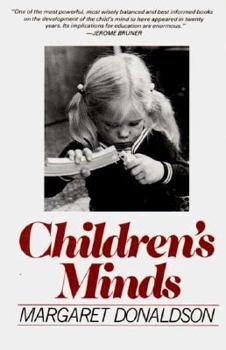Children's Minds
Select Format
Select Condition 
Book Overview
How and when does a child begin to make sense of the world? Why does a lively preschool child so often become a semiliterate and defeated school failure? This description may be from another edition of this product.
Format:Paperback
Language:English
ISBN:0393951014
ISBN13:9780393951011
Release Date:September 1979
Publisher:W. W. Norton & Company
Length:176 Pages
Weight:0.55 lbs.
Dimensions:0.7" x 5.4" x 8.2"
Customer Reviews
1 rating
Challenges to the theories of Piaget and Chomsky
Published by Thriftbooks.com User , 23 years ago
This is a very easily read book putting forward key arguments against the theories of Piaget and Chomsky and proposing action steps to make more children succeed in todays' school environment (she sees rankings at school and the resulting feeling of being a failure as the key demotivating factor leading to children stopping development). Her main criticism of Piaget is that he is drawing his conclusion from experiments that are ill-fitted for children. First, she challenges the postulate of "egocentrism" in the ages below 7. She proves by sharing experiments of her own and her research fellows that children who failed in Piaget's "mountain experiment" (the task to describe 3 differently coloured mountains from a doll's rather than one's own perspective), suceeded in her "policemen experiment", where the child is asked to hide from a policeman requiring it to take the view of the policeman to find the right hiding position. Her argument is that children are very well capable of seeing the POV of other people as long as this is relevant to them. While children below the age of 7 know very well the situation of having to hide in order to avoid punishment, they cannot identify with a doll's view of 3 mountains. The same way she proves that the capability to reason deductively ( a skill Piaget denies for children below 7) does exist in children but can only be shown in experiments that reflect the fact that children do have their own interpretation of the experimenters question, intention as well as the meaning of the situation based on their individual history. She continues with experiments proving that making sense of situations comes BEFORE language understanding that Chomsky's assumption of a LAD has no ground. And she finishes with applying her findings in her vision on how more children could be successful in our school system.





